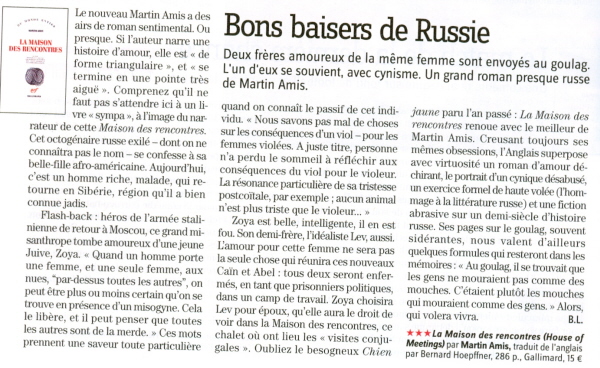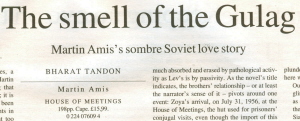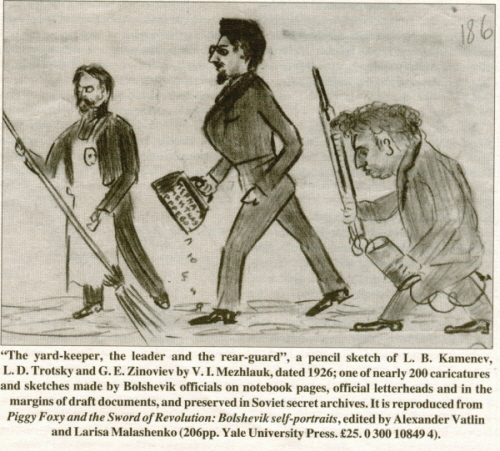TẠP GHI
Nhà Hội
1 2
|
Gấu,
nhà văn
Nhà Hội
Gấu đọc bài thơ của Hoàng
Hưng, cùng lúc đọc Nhà Hội, House of Meetings của Amis, cũng
viết về xứ
sở đó, và cùng lúc, nhớ những ngày Gấu đã ở đó.
Câu thơ "Vợ khóc một đêm" làm Gấu nhớ tới, một trong những câu mở ra Nhà
Hội.
Đây là chuyện tình tay ba, giữa hai anh em cùng mẹ khác
cha, cùng yêu một
cô gái. Cô gái lấy người em, và người em đi tù, cô từ Moscow đi thăm
nuôi chồng,
ở mãi Biển Bắc, thuộc Bắc Cực, và được ngủ lại với chồng tại nhà hội.
Đêm đó là
đêm tân hôn của họ, tuy đã lấy nhau từ bao năm. Ông anh chồng cũng bị
tù tại
đó, và ông anh lo dọn giuờng, trang hoàng nhà hội cho đêm tân hôn của
hai vợ chồng!
Ông em bị bắt, chỉ vì ca ngợi Mẽo, America, trong khi, sự thực, Mẽo,
America,
là "code name" của Zoya, cô bạn gái người Do Thái mà hai anh em cùng
yêu. [Lý do Hoàng Hưng bị bắt không "thơ mộng" như ở đây. Xin xem ông
trả lời phỏng vấn trên RFA]
It's a love story. So of course I must begin with the House of Meetings.
Đây là một câu chuyện tình. Và như thế, lẽ tất nhiên, tôi phải bắt đầu
bằng Nhà
Hội.
*
... in his new novel, House of Meetings, the first since the widely
criticized
Yellow Dog (2003), Amis has subjected himself to a decided cooling-off.
House
of Meetings is short, the prose is controlled, the humor sparse, while
the
characters strike us as real, or at least possible, people. It is a
remarkable
achievement, a version of the great Russian novel done in miniature,
with
echoes throughout of its mighty predecessors. There is the Dostoevskyan
struggle between ill-matched brothers carried on against a vast and
unforgiving
Tolstoyan landscape; there is a star-crossed Zhivagoan love that
endures a
lifetime; there are immense journeys, epic sufferings, agonized
renunciations,
unbearable losses; there is even a revelatory letter, kept for twenty
years and
only read on the brink of death, as well as a homely sister, called
Kitty,
whose task it is to fill in this or that necessary detail of the
narrative.
The book tells the story of two half-brothers, both of whom are in love
with
the same woman, Zoya, and both of whom spend terrible years together in
one of
the labor camps of the Gulag. The unnamed narrator, a decorated hero of
the war
against Hitler, who defected to America in the 1980s and made his
fortune
through the invention of an item of prosthetic gadgetry, has returned
to Russia
to revisit the place in the far north of Siberia where he and his
brother, Lev,
were held as slave workers from the late 1940s until well into the
1950s, after
Stalin had died. Neither of them had committed any crime. The narrator
was
arrested, like many Russian veterans who fought in Germany,
on suspicion of having been exposed to fascist and Western influences
while
outside the USSR.
Lev was convicted for having been heard "praising America"
in his college cafeteria line (in fact, he had been praising "The
America's," his code name for Zoya)...
Trong cuốn tiểu thuyết mới, cuốn đầu tiên kể từ cuốn bị phạng tơi bời Chó
Vàng (2003), Amis tự ép mình vào một văn phong thư giãn, không nặng
nề như
những cuốn trước. Ông tự nhận ông là một thứ nhà văn gây sốc, a 'shock'
writer.
Thế nào là một nhà văn 'sốc'? Ngay trong thư mở ra Nhà Hội, ông
giải
thích: Vào thập niên 1930, có một người thợ mỏ tên Aleksei Stakhanov,
mà theo
như một số người, đã đào được hơn một trăm tấn than - chỉ tiêu là
7 tấn -
chỉ trong một ca. Từ đó có thuật ngữ, "sự thờ phụng những Stakhanov",
"the cult of the Stakhanovites", hay những "shock-workers."
Và cũng từ đó, ra thuật ngữ "shock-writers": Những nhà văn được lấy
ra khỏi đội lao động, và được huấn luyện, để viết như điên, những bài
văn tuyên
truyền, ngụy trang thành những cuốn tiểu thuyết. Ông viết, tôi là một
"shock" writer như thế, nhưng mà để nói ra sự thực.
Nhà Hội ngắn, giọng văn được kiềm chế, hài, hề
sơ sơ, trong khi những
nhân vật đập vào mắt độc giả, như người thực, hoặc cố như thực. Một
thành tựu
đáng kể: một ấn bản của thứ đại tiểu thuyết của Nga được thu nhỏ lại,
trong đó
vang vọng lên những bậc tiền nhân, là những đại tiểu thuyết gia Nga. Ở
trong
đó, có cuộc chiến đấu, đúng kiểu của Dos, giữa hai anh em chẳng có tí
tị gì hợp
nhau, cùng đâu lưng chống lại một phong cảnh rộng lớn bao la không thể
nào tha
thứ, đúng kiểu của Tolstoy, trong đó có một cuộc tình, đúng kiểu Bác
sĩ
Zhivago của Pasternak, thứ tình yêu sao quả tạ chiếu mệnh kéo dài
cả một đời
người...
John Banville: Bài
Ca Của Tên Đao Phủ
*
Những nhà văn được lấy ra khỏi đội lao động, để viết như điên... Ui
chao, thôi
đành vậy, đành phải bắt chước nhà văn nhớn Nobel văn chương, Gunter
Grass,
nghĩa là, đành phải thú tội trước bàn thờ:
Gấu này, trong hai năm lao động khổ sai tại nông trường Đỗ Hải, được
lấy ra khỏi
đội lao động, là cũng để làm một shock-writer. Cứ gần đến ngày lễ lớn
của dân tộc,
là viết như điên, để ca ngợi Đảng và Nhà Nước VC.
*
Con tầu rền rĩ, khi tớ trở lại
vùng biển Bắc Cực, nơi có những trại
tù gulags. Đ.M. Tha lỗi, tớ văng tục. Đó là điều dơ dáy cuối cùng mà
một thằng
già 85 tuổi còn có thể làm được. Và bạn còn phải nghe nhiều, về những
điều còn
tục tằn hơn thế nữa.
Bạn biết, tớ là anh hùng trong
cuộc chiến Yêu Nước, tớ bị án tù 10
năm ở Norlag, sau đó chỉ ít lâu. Bạn không biết, tớ đã từng "làm thịt",
"đưa em vào Hạ", rất nhiều ghệ Đức, năm 1945. Hãnh diện?
Không. Xin tha thứ? Cũng không. Đó là một cách ở đời. Lính tráng mà. Ghệ
mà. Chúng tớ hiểu luật chơi.... Tớ không thể nào chịu nổi, có một em sờ
sờ ra
đó, mà lại không chịu làm ăn, không chịu chiếm đoạt. Không chịu tỉ tê,
hỏi coi
em đã từng đụng trận ra làm sao. Bao nhiêu trận rồi, bao nhiêu thằng đi
qua đời
em rồi.... ấy vậy mà, khi thằng em của tớ đến trại, tớ như đứng tim,
khi nghe
nó nói, Zoya bi giờ là vợ của em.

Bons baisers de
Russie
Tờ Lire đọc Nhà Hội, của Martin Amis, bản tiếng Tây:
Những nụ hôn bồng bồng từ Liên Xô: Cái tít này, là
từ Ian Fleming. Thành
thử thật khó dịch từ "Bon", vì nó còn liên quan đến James Bond.
Tên tôi là Bond. James Bond.
Tên tôi là Gấu. Gấu nhà văn.
Bons baisers de Russie
Deux frères amoureux de la même
femme sont envoyés au goulag. L'un
d'eux se
souvient, avec cynisme.
Un grand roman presque russe de Martin Amis.
Le nouveau Martin Amis a des
airs de roman
sentimental. Ou presque, Si l'auteur narre une histoire d'amour, elle
est « de
forme triangulaire », et « se termine en une pointe très aiguë ».
Comprenez
qu'il ne faut pas s'attendre ici à un liivre « sympa », à l'image du
narrrateur
de cette Maison des rencontres, Cet octogénaire russe exilé -
dont on ne
connaîtra pas le nom - se confesse à sa belle-fille afro-américaine.
Aujourd'hui, c'est un homme riche, malade, qui reetourne en Sibérie,
région
qu'il a bien connue jadis.
Flash-back: héros de l'armée
stalinienne
de retour à Moscou, ce grand misanthrope tombe amoureux d'une jeune
Juive, Zoya.
« Quand un homme porte une femme, et une seule femme, aux nues,
"par-dessus toutes les autres", on peut être plus ou moins certain
qu'on se trouve en présence d'un misogyne, Cela le libère, et il peut
penser
que toutes les autres sont de la merde. » Ces mots prennent une saveur
toute
particulière quand on connaît le passif de cet individu, «Nous savons
pas mal
de choses sur les conséquences d'un viol- pour les femmes violées, Au
juste
titre, personne n'a perdu le sommeil à réfléchir aux conséquences du
viol pour
le violeur, La résonance particulière de sa tristesse postcoïtale, par
exemple;
aucun animal n'est plus triste que le violeur ... »
Zoya est belle, intelligente,
il en est
fou, Son demi-frère, l'idéaliste Lev, aussi. L'amour pour cette femme
ne sera
pas la seule chose qui réunira ces nouveaux Caïn et Abel : tous deux
seront
enferrmés, en tant que prisonniers politiques, dans un camp de travail.
Zoya
choisira Lev pour époux, qu'elle aura le droit de voir dans la Maison
des
rencontres, ce chalet où ont lieu les « visites conjuugales ».
Oubliez le
besogneux Chien jaune paru l'an passé: La Maison des rencontres
renoue avec le meilleur de Martin Amis. Creusant toujours ses mêmes
obsessions,
l'Anglais superpose avec virtuosité un roman d'amour déchirant, le
portrait
d'un cynique désabusé, un exercice formel de haute volée (l'hommage à
la
littérature russe) et une fiction abrasive sur un demi-siècle
d'histoire russe,
Ses pages sur le goulag, souvent sidérantes, nous valent d'ailleurs
quelques
formules qui resteront dans les mémoires: « Au goulag, il se trouvait
que les
gens ne mouraient pas comme des mouches. C'étaient plutôt les mouches
qui
mouraient comme des gens. » Alors, qui volera vivra.
Baptiste Liger
Lire, Avril 2008
***
La Maison des rencontres
(House of
Meetings) par Martin Amis, traduit de l'anglais par Bernard
Hoepffner, 286
p., Gallimard, 15 €
Tờ Lire đọc Nhà
Hội, của Martin Amis, bản tiếng Tây:
Những nụ hôn bồng bồng từ Liên Xô: Cái tít này, là
từ Ian Fleming. Thành
thử thật khó dịch từ "Bon", vì nó còn liên quan đến James Bond.
Tên tôi là Bond. James Bond.
Tên tôi là Gấu. Gấu nhà văn.
Nhà
Hội
Gấu có nhớ nhà
không?
Có nhớ, nhưng nhớ nhất, là nhớ
Nhà Hội
Nhà Hội, với Gấu,
là cuốn sách tuyệt cú mèo.
Buồn buồn, là lôi ra đọc. Là nhớ Phạm Văn Cội, Củ Chi. Nhớ Đỗ Hải, Nhà
Bè.
*
Mùi của Gulag
Tuyệt thật: Mùi của Gulag!
Mùi của bà vợ, vượt ngược Trường Sơn đi thăm chồng cải tạo.
Ui chao, thảo nào Nã Phá Luân Đại Đế, từ chiến trường, viết thư cho
nàng
Joséphine, ra lệnh, ba ngày nữa Trẫm về. Không được tắm, chờ Trẫm về
"hửi" cho đã thèm!
Nhân
vật là định mệnh.


Pitched as a
voice from beyond the grave, the posthumously edited testimony of an
old
Russian émigré and Gulag survivor, it offers double-tracked narrative,
in which
private public histories blur and contend, all the more strongly given
the
particular situation the recalls - one in which fiction's traditional
points of
focus might become dislocated:
Yes, so far as the individual
is concerned Venus, it may very well be
true that character is destiny. And the other way round. But on the
larger
scale character means nothing. On the larger scale, destiny is
demographics; demographics is a monster. When you look into it, when
you look
into the Russian case you feel the stirrings of a massive force, a not
only
blind but altogether insentient, like an earthquake or a tidal wave.
"Character
is destiny" brings a distant memory, not only of Saul Bellow's A March,
but of Thomas Hardy's The May Casterbridge, remembering George Eliot's
Mill on
the Floss, remembering Novalis. The borrowing that Amis lends his
narrator
simultaneously alerts a reader to a line of fictional wisdom, and hints
at the obsolescence
of wisdom amid the enormities of Stalinist terror. Likewise, the
central plot
of House of Meeting is one of the oldest stories, a love triangle...
TLS September 29, 2006
|
|



